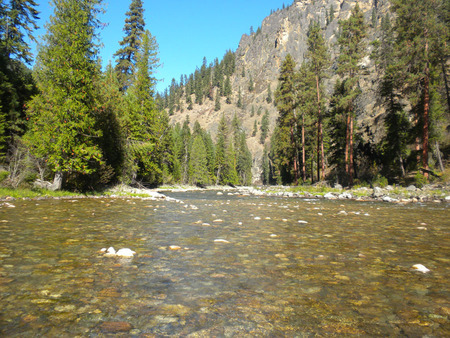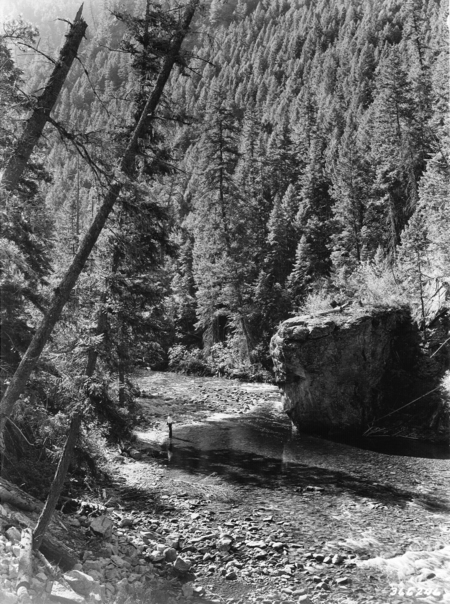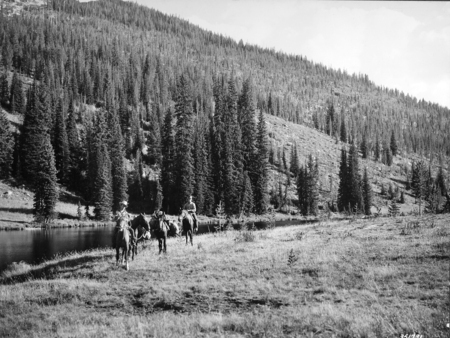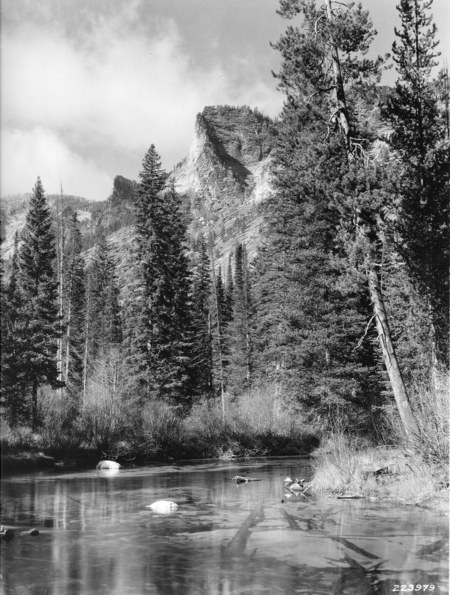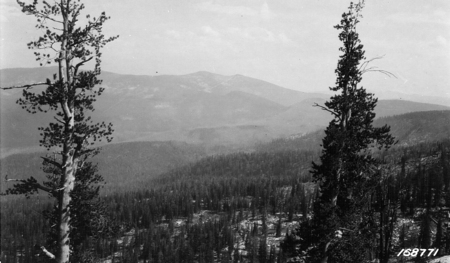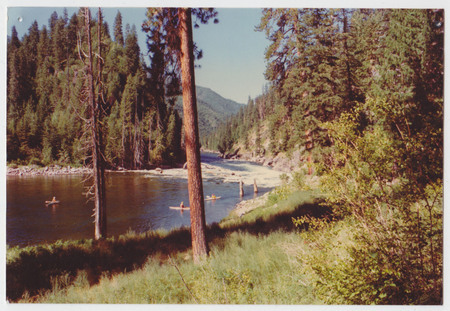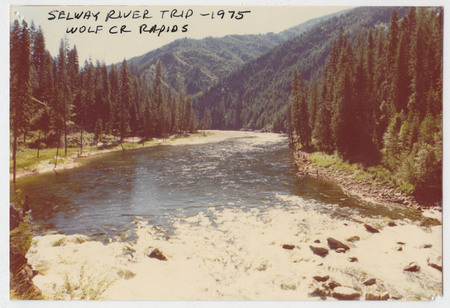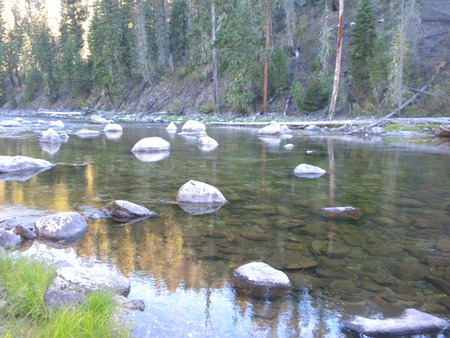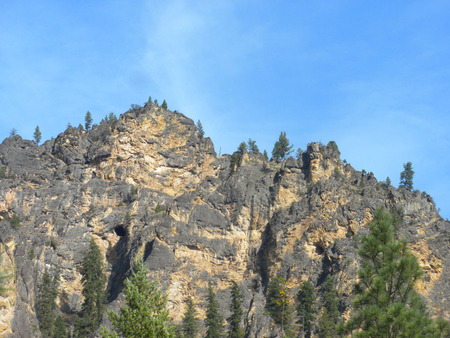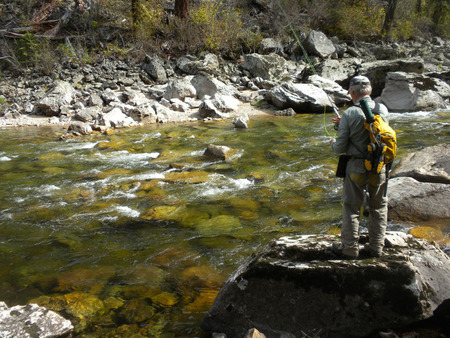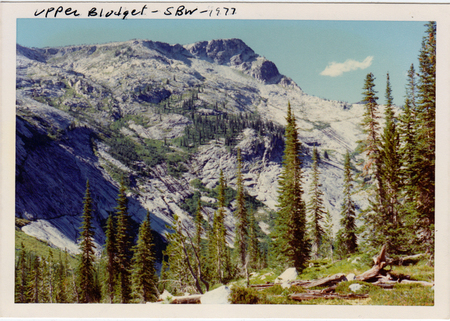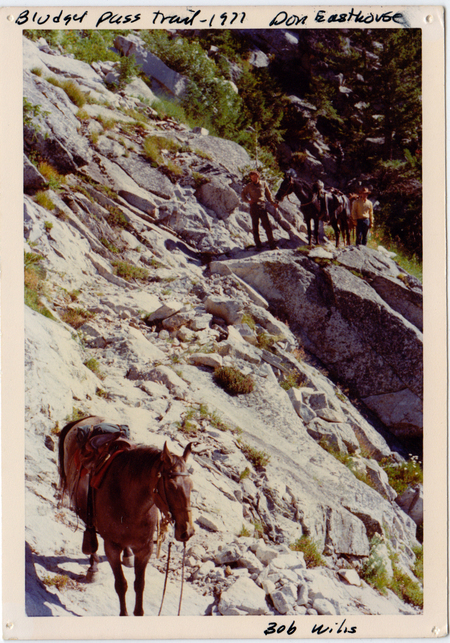Episode 17 : What is the Greatest Threat to Wilderness : a special collective interview Item Info
This is a special episode, titled “What is the Greatest Threat to Wilderness?” Debbie Lee, our project coordinator, asked many of the oral history interviewees this question, and she received some surprising and enlightening answers. Among the interviewees in this podcast are Penny Keck, a longtime resident of the Selway-Bitterroot area who managed equipment for the Forest Service, as well as worked with her husband Emil to build and maintain many of the bridges and buildings. We hear from Ed Bloedel, who helped write the first wilderness management plans, Eric Melson and Rob Mason who currently work for the Selway-Bitterroot Foundation, and Warren Miller and Bruce Farling, who worked as Forest Rangers in the Moose Creek district in the 1970’s and 1980’s after the passage of the 1964 Wilderness Act. From these varying perspectives, we hear about the possible future of wilderness areas and their importance in the lives of current and future generations.
Slideshow: Scenic landscapes from the Selway-Bitterroot Wilderness at various points during the past century, show how little the protected landscape has changed. In this place, it is possible to view wild land as it once was, and to enjoy the tranquility of recreation in a pristine area.
Episode 17 : What is the Greatest Threat to Wilderness : a special collective interview [transcript]
00:00:00:00 - 00:00:29:20 Debbie Lee: Welcome to the Subway Bitterroot Wilderness History Project, which is made possible by a grant from the National Endowment for the Humanities. The University of Idaho, and Washington State University. Part of the project’s mission is to collect, preserve, and make public oral histories documenting the history and people of the Solway Bitterroot Wilderness. For more information, please visit our website at SPW lib argue idaho.edu.
00:00:29:22 - 00:00:54:20 Debbie Lee: And then I think people, I think people get so much out of being in a wilderness setting once you take away cars and money and telephones, people are different and they are different to each other, I think. And, and, and then they draw on things in themselves that maybe are a little rusty from our crazy life out here.
00:00:54:20 - 00:01:25:19 Debbie Lee: Now, I think the ways that people get along when they’re isolated in a place like that, that they place that they want to be, are really it’s a wonderful thing.
00:01:25:21 - 00:01:54:12 Debbie Lee: Thank you for joining us for the 17th episode of the Selway Bitterroot Wilderness History Project. This is a special episode titled What is the Greatest Threat to Wilderness? Debbie Lee, our project coordinator, asked many of the oral history interviewees this question, and she received some surprising and enlightening answers among the interviewees in this podcast are Penny Keck, a long time resident of the Selway Bitterroot area who managed equipment for the Forest Service, as well as worked with her husband.
00:01:54:12 - 00:02:17:04 Debbie Lee: Email to build and maintain many of the bridges and buildings. We hear from Ed Bledel, who helped write the first wilderness management plans, Eric Nelson and Rob Mason, who currently work for the South Bitterroot Foundation, and Warren Miller and Bruce Darling, who worked as forest rangers in the Moose Creek district in the 1970s and 1980s. After the passage of the 1964 Wilderness Act.
00:02:17:07 - 00:02:26:20 Debbie Lee: From these varying perspectives, we hear about the possible future of wilderness areas and their importance in the lives of current and future generations.
00:02:26:22 - 00:02:35:08 Debbie Lee: so what do you think is the biggest threat to wilderness right now at this point in time?
00:02:35:11 - 00:02:39:27 Ed Boedel, Penny Keck, Bruce Farling, Eric Melson, Rob Mason or Warren Miller Well.
00:02:39:29 - 00:02:45:24 Ed Boedel, Penny Keck, Bruce Farling, Eric Melson, Rob Mason or Warren Miller It’s I’m a little bit conflicted.
00:02:45:26 - 00:03:21:15 Ed Boedel, Penny Keck, Bruce Farling, Eric Melson, Rob Mason or Warren Miller Because of my experience. So working with wilderness, while I still work on these issues, that still work. I worked with, the Central Idaho Wilderness Act. Political politics, I guess. This is Congressman, writing into the bills, though. This is wilderness. But you should be able to use motorized use. You should be able to go in and do, dig with the diggers, build up big water tanks for for grouse and birds to be able to feed for, for bighorn sheep in Arizona is bighorn sheep.
00:03:21:15 - 00:03:50:16 Ed Boedel, Penny Keck, Bruce Farling, Eric Melson, Rob Mason or Warren Miller These other bighorns have to have water or they won’t survive. Well, how did they survive for hundreds of thousands of years before we came along and said and made it a wilderness, and we got to dig these big water tanks, and we have two big diggers in there to do it. those attacks are coming from politicians, and they’re coming from some weakness within our own agency to say no.
00:03:50:19 - 00:04:06:03 Ed Boedel, Penny Keck, Bruce Farling, Eric Melson, Rob Mason or Warren Miller not to me. I don’t like to say that because I love the service. I love my job. I was, it was the best job in the world. And, but we’re we’re we’re making some decisions.
00:04:07:02 - 00:04:43:20 Ed Boedel, Penny Keck, Bruce Farling, Eric Melson, Rob Mason or Warren Miller Yeah. We met the enemy and and it’s us, but it’s not coming just from us. It’s coming from politics and political pressure from motorized users that want more, from, dam people that own dams, that want to convenience, that convenience of using the power tools and so forth, because it’s going to and a cheapness, the expense. So those are the biggest threats that plus, air pollution, which we haven’t got any real handle on at all yet for a lot of wildernesses in our country.
00:04:43:22 - 00:05:30:05 Ed Boedel, Penny Keck, Bruce Farling, Eric Melson, Rob Mason or Warren Miller Not the not these, not the subway bitterroot yet. although some acid rain probably has fallen on it, but, all around our country, where we have beautiful walruses that are near coal fired plants, or other places that throw on acid rain, we still have some serious problems there, but to me, the biggest threat is still, people that come up and want their own way with wilderness if they’re a politician or if they’re inside the agency or if they’re outside, if they’re motorized users that want their own way, that want what they want, instead of looking at the act and saying, here’s the, resource, a resource of loners, a place where we
00:05:30:05 - 00:05:48:17 Ed Boedel, Penny Keck, Bruce Farling, Eric Melson, Rob Mason or Warren Miller can look at that used to be this way and say, what have we done outside? How much have we changed the world? I can go in there and see that the world hasn’t changed, I haven’t changed, I look, here’s why I am I have to depend on myself to protect myself from a bear or whatever it is that’s out there I have to keep.
00:05:48:22 - 00:06:07:18 Ed Boedel, Penny Keck, Bruce Farling, Eric Melson, Rob Mason or Warren Miller I have to make shelter. I have to keep warm. And we lose our land if we don’t, if we don’t maintain that. So the biggest threat is these people that want something for their own use. or want the, the comfort and convenience of, of doing it that way.
00:06:07:22 - 00:06:08:03 Debbie Lee: Yeah.
00:06:08:06 - 00:06:29:29 Ed Boedel, Penny Keck, Bruce Farling, Eric Melson, Rob Mason or Warren Miller Yeah, we get it from sheriffs that, you know, we go, oh my gosh, we got gotta, we gotta run in there to, to rescue people all the time. Therefore we should have some radios tower so we can some cell tower. So we we don’t we don’t need that. We’ve got to have some places where we’ve left civilization behind.
00:06:30:02 - 00:06:38:09 Ed Boedel, Penny Keck, Bruce Farling, Eric Melson, Rob Mason or Warren Miller Yeah. And that’s, that’s what we’re in. So. Yeah.
00:06:38:12 - 00:06:49:13 Debbie Lee: Yeah, yeah. So what do you think the biggest threat to wilderness is then?
00:06:49:15 - 00:07:00:12 Debbie Lee: You. That’s an interesting question. And I don’t know if I have the.
00:07:00:14 - 00:07:44:11 Debbie Lee: Background capability, knowledge to appropriately address that. I can give you upbeat responses, but would they be? I’d have to think about that for a while because of the fact that the threat to the wilderness. I think it’s exterior, not interior. I know that, oh, what is it political? Because it can be removed with their politics. And.
00:07:44:13 - 00:08:28:20 Debbie Lee: Or is it the overall lifestyle of the earth. In other words the earth is reaching its carrying capacity. It’s influencing the wilderness whether it’s through acid rain, through a lot of other items being slowly carried, transported somehow into there, I don’t know, but it’s evolving and changing as we speak whether we it nothing is static and but we are.
00:08:28:22 - 00:09:00:15 Debbie Lee: Moving it more rapidly to a state that it probably wouldn’t move toward. the biggest threat. I don’t think there’s no one biggest threat. I think there’s several. And, It’ll be interesting to see in the future what that shall be.
00:09:00:17 - 00:09:06:22 Debbie Lee: And what do you think the biggest threat to wilderness is right now?
00:09:06:25 - 00:09:18:01 Ed Boedel, Penny Keck, Bruce Farling, Eric Melson, Rob Mason or Warren Miller Well, the whole array of human influences, obviously, and in, you know, in that array,
00:09:18:03 - 00:09:42:29 Ed Boedel, Penny Keck, Bruce Farling, Eric Melson, Rob Mason or Warren Miller You know, the thing about the concept of wilderness, it’s really actually if you, you know, it’s a human construct, really. We, you know, there’s this thing out there, we call it wilderness, and this is the values we put on it. But the value that is pretty meaningful is the whole idea is to have sort of nature functioning without human or as minimal human influence as possible.
00:09:43:02 - 00:09:59:22 Ed Boedel, Penny Keck, Bruce Farling, Eric Melson, Rob Mason or Warren Miller Now we’ve got and we’ve been able, you know, you can do a pretty good job of that when it’s, you know, dealing with individuals going in there, you know, stay on this trail, don’t go over here, you know, don’t trash. But you can deal with that. You can minimize. But we now have these global influences that are really that we’ve caused that are really huge.
00:09:59:22 - 00:10:23:23 Ed Boedel, Penny Keck, Bruce Farling, Eric Melson, Rob Mason or Warren Miller We climate change is huge. So I think that is and the other the other it’s sort of it’s not quite global. It is it is a global problem. But but invasive species. You know where we’re moving stuff into these, you know, get that sort of naturally functioning ecosystem doesn’t function naturally when all of a sudden your air drop.
00:10:23:23 - 00:10:45:29 Ed Boedel, Penny Keck, Bruce Farling, Eric Melson, Rob Mason or Warren Miller And these species that evolved from somewhere else in there, you know, and obviously we’ve got issues with weeds and stuff like that, but there’s aquatic invasive species. We’re really worried about showing up in places. And yeah. I don’t even think we’ve begun to, to, conceive some of the, some of the stuff that could show up in a place like this.
00:10:45:29 - 00:10:46:18 Ed Boedel, Penny Keck, Bruce Farling, Eric Melson, Rob Mason or Warren Miller So I better get.
00:10:46:18 - 00:10:52:26 Unknown That to be a problem.
00:10:52:28 - 00:10:58:07 Debbie Lee: What do you think the biggest threat to wilderness is?
00:11:02:18 - 00:11:34:04 Ed Boedel, Penny Keck, Bruce Farling, Eric Melson, Rob Mason or Warren Miller The biggest threat to wilderness is, in my opinion, the lack of the younger generations use and appreciation. I think that would be the number one on my list. And the whole concept of wilderness slowly being forgotten about. It seems like, you know, in the 60s, in the 70s, with the environmental movement and all of that, there is this the steam, that ball was rolling.
00:11:34:04 - 00:12:03:07 Ed Boedel, Penny Keck, Bruce Farling, Eric Melson, Rob Mason or Warren Miller It was a snowball effect. Like it just got bigger and bigger and bigger and people got behind it. The whole idea of wilderness, I think, is the greatest idea that that America has ever had to set aside land solely on the purpose of setting aside land for its values in and saving it for future generations so that an ever encroaching population can can use it or not use it.
00:12:03:07 - 00:12:31:04 Ed Boedel, Penny Keck, Bruce Farling, Eric Melson, Rob Mason or Warren Miller But can enjoy it. And I think that with the influx in technology and with iPhones and video games and wanting it now, and just with technology and society and the way that we’re moving towards this fast paced, ever evolving culture, that it’s going to get forgotten about and people are going to say, why did we do that again?
00:12:31:07 - 00:12:55:16 Ed Boedel, Penny Keck, Bruce Farling, Eric Melson, Rob Mason or Warren Miller Like, what’s what’s the point of wilderness? And, you know, when they’re all so busy on their iPhones and their, their internet chat and their, you know, they have to update on their blog and they have to tweet things that they won’t realize what they have in their backyard. And that, I think is my is the single greatest threat is that it’s going to get forgotten about.
00:12:55:16 - 00:13:19:06 Ed Boedel, Penny Keck, Bruce Farling, Eric Melson, Rob Mason or Warren Miller And that ball is going to slowly slow down. And the momentum of the idea and the culture behind wilderness, the leaders that we’ve had, the champions that created wilderness and fought for it and realized that it’s now or never, you know, like, we can save these areas now or they can go on cutting these areas. They can go on extracting these areas.
00:13:19:06 - 00:13:44:01 Ed Boedel, Penny Keck, Bruce Farling, Eric Melson, Rob Mason or Warren Miller They can go on abusing these areas. And I think that I think that positive experiences in wilderness are the only way that it’s going to happen. And getting kids engaged in their their natural areas around their homes, you know, the creek behind their house, building forts, snowball fights, you know, little things like that, like getting kids outside.
00:13:44:01 - 00:14:03:23 Ed Boedel, Penny Keck, Bruce Farling, Eric Melson, Rob Mason or Warren Miller Like, that’s the single greatest thing is kids now are more focused on getting home and getting the next level on their video game than they are about going and riding their bike and jumping off of something and breaking their arm. You know, like what happened to the playgrounds with pea gravel, where you get scrapes and you have rocks embedded in your shoulder, you know?
00:14:03:23 - 00:14:25:19 Ed Boedel, Penny Keck, Bruce Farling, Eric Melson, Rob Mason or Warren Miller No, like it’s become easier now. There’s foam mats because parents get mad because their kid came home with a scraped knee, and it’s the school’s fault because they have pea gravel. And like we as a society have gotten soft like we really have. And wilderness will never get soft. It’s always hard, it’s always going to be difficult. And we need that.
00:14:25:19 - 00:14:47:03 Ed Boedel, Penny Keck, Bruce Farling, Eric Melson, Rob Mason or Warren Miller Like we have to have that because it’s where we came from. and it gives us a chance to go back to that, gives us a chance to go back to a landscape that was never touched and never will be touched. and technology doesn’t belong there, you know, mechanized mechanical things don’t belong there. It’s it’s human power.
00:14:47:06 - 00:15:07:19 Ed Boedel, Penny Keck, Bruce Farling, Eric Melson, Rob Mason or Warren Miller And it it’s going to be hard and we need it. And I think that technology and the combination of of the lack of interest from younger generations, are the single greatest thing that they’re compromising wilderness right now, in my opinion.
00:15:07:22 - 00:15:18:16 Debbie Lee: So what do you feel is the biggest threat to wilderness? Maybe not. Not just to the subway, but to wilderness in general.
00:15:18:19 - 00:15:51:17 Ed Boedel, Penny Keck, Bruce Farling, Eric Melson, Rob Mason or Warren Miller well, it’s, I mean, there’s you could talk about short term and long term threats. and the long term threat. I know, Eric had talked about this. I totally agree with what he said. He said unquestionably, the biggest long term threat is awareness in the American public of what wilderness is and why it’s important, and that without that awareness that it puts it puts into question the ability to have political support for wilderness.
00:15:51:17 - 00:16:19:16 Ed Boedel, Penny Keck, Bruce Farling, Eric Melson, Rob Mason or Warren Miller And, you know, while we’d like to think of wilderness as not as this place that’s protected and whatever, and the reality is, it’s not it’s, politics made the protection of the soil where possible and continue to make it possible. But someday, if the politics, if the support isn’t there politically to protect these areas, they could just as easily get turned back into, you know, a non wilderness area.
00:16:19:19 - 00:16:56:20 Ed Boedel, Penny Keck, Bruce Farling, Eric Melson, Rob Mason or Warren Miller and so I would definitely say the biggest threat is about awareness in the American public, about the value of protecting places as, as wilderness or as, you know, untrammeled areas. I wouldn’t even say it has to be wilderness, just protecting places in general for qualities that are important to an ecosystem, that that allow humans and other things to thrive that provide those benefits, I guess clean water, clean air.
00:16:56:23 - 00:17:21:23 Ed Boedel, Penny Keck, Bruce Farling, Eric Melson, Rob Mason or Warren Miller seed beds of genetic diversity, which is hugely important to, the world and certainly to humans. so, there’s other short term, I mean, the biggest short term threat in the South, I would say, is unquestionably weeds, invasive weeds. of course, you can get into the argument of what’s there. Are invasive weeds natural or not natural.
00:17:21:23 - 00:17:51:01 Ed Boedel, Penny Keck, Bruce Farling, Eric Melson, Rob Mason or Warren Miller And and that is an important argument to have. But, if if you just take of the premise that invasive weeds aren’t natural, then that’s a huge threat that is incredibly hard to control. and it definitely is changing the character of the wilderness and will continue to, in terms of hydrology, in terms of vegetation, in terms of habitat for species and therefore species themselves.
00:17:51:04 - 00:18:01:29 Ed Boedel, Penny Keck, Bruce Farling, Eric Melson, Rob Mason or Warren Miller I guess, yeah, I guess that’s what I would say is, the biggest threats to what is.
00:18:02:01 - 00:18:15:08 Debbie Lee: Well, Lauren, what do you think is the biggest threat to wilderness?
00:18:15:11 - 00:18:18:13 Ed Boedel, Penny Keck, Bruce Farling, Eric Melson, Rob Mason or Warren Miller who?
00:18:18:15 - 00:18:33:02 Ed Boedel, Penny Keck, Bruce Farling, Eric Melson, Rob Mason or Warren Miller Well, first things come to mind. Is apathy. and a.
00:18:33:05 - 00:18:39:19 Ed Boedel, Penny Keck, Bruce Farling, Eric Melson, Rob Mason or Warren Miller the lack or the change of.
00:18:39:22 - 00:18:52:00 Ed Boedel, Penny Keck, Bruce Farling, Eric Melson, Rob Mason or Warren Miller Demographics from the lack of anything else, from a rural to an urban environment where.
00:18:52:02 - 00:19:02:28 Ed Boedel, Penny Keck, Bruce Farling, Eric Melson, Rob Mason or Warren Miller I think a large percentage of the population is so out of contact with the,
00:19:03:00 - 00:19:08:08 Ed Boedel, Penny Keck, Bruce Farling, Eric Melson, Rob Mason or Warren Miller Where the rural, the supports them.
00:19:08:10 - 00:19:28:29 Ed Boedel, Penny Keck, Bruce Farling, Eric Melson, Rob Mason or Warren Miller That they don’t have any investment in the rural that supports them. And consequently, there is not a sense of need to support that. So that,
00:19:29:02 - 00:20:02:26 Ed Boedel, Penny Keck, Bruce Farling, Eric Melson, Rob Mason or Warren Miller In order to maintain a resource which wilderness is, I think, you have to have support for it, because there are lots of forces that are interested in, extracting resources from wilderness. And unless you have a counterbalance to that, the, you know, the extractive forces will prevail. And just the fact that wilderness has been legislated, by Congress.
00:20:02:29 - 00:20:35:05 Ed Boedel, Penny Keck, Bruce Farling, Eric Melson, Rob Mason or Warren Miller Means that it can be, legislated if if there’s enough interest and pressure to do that. So that’s I think that’s one of the biggest concerns that I have is that there’s not. The biggest threat is a lack of support base or a diminishing support base. is I think what I well, I but most concerns me. I mean, there are the things which of course will modify wilderness, things like global warming and that.
00:20:35:05 - 00:20:49:10 Ed Boedel, Penny Keck, Bruce Farling, Eric Melson, Rob Mason or Warren Miller But I, that’s not a to me, that’s not a threat in the same sense of that.
00:20:49:12 - 00:21:30:01 Ed Boedel, Penny Keck, Bruce Farling, Eric Melson, Rob Mason or Warren Miller The, the, what’s the word I want to use? declassifying wilderness things, is and the resulting mayhem that that can that can result in, Yeah, that’s I know I, I suspect that in the, in the, in the, environment that we have now that we probably would not be able to create wilderness because there’s just not support for it or create wilderness in the same way that it was done at all.
00:21:30:03 - 00:21:31:23 Ed Boedel, Penny Keck, Bruce Farling, Eric Melson, Rob Mason or Warren Miller prior to 1964.
00:21:31:24 - 00:21:33:11 Debbie Lee: Yeah.
00:21:34:09 - 00:21:37:21 Debbie Lee: Interesting.
00:21:37:24 - 00:22:04:26 Debbie Lee: Thank you for joining us for this episode of the Selway Bitterroot Wilderness History Project, which has been made possible by the National Endowment for the Humanities, the University of Idaho, and Washington State University. The project coordinator is Debbie Lee, recorded and produced by Aaron Jepson.
Gallery
- Title:
- Episode 17 : What is the Greatest Threat to Wilderness : a special collective interview
- Creator:
- Debbie Lee; Ed Bloedel; Penny Keck; Bruce Farling; Eric Melson; Rob Mason; Warren Miller
- Date Created (ISO Standard):
- 2012-05-14
- Description:
- Interviewee : Ed Boedel, Penny Keck, Bruce Farling, Eric Melson, Rob Mason, Warren Miller | Interviewer : Debbie Lee | Date : May 14, 2012 | This is a special episode, titled 'What is the Greatest Threat to Wilderness?' Debbie Lee, our project coordinator, asked many of the oral history interviewees this question, and she received some surprising and enlightening answers.
- Subjects:
- podcasts administration conservation education fire fire management 1964 wilderness act selway-bitterroot foundation
- Section:
- Wilderness Voices
- Location:
- Selway-Bitterroot Wilderness (Idaho and Mont.)
- Publisher:
- Wilderness Voices, The Selway-Bitteroot Wilderness History Project, https://selwaybitterrootproject.wordpress.com/
- Original URL:
- https://selwaybitterrootproject.wordpress.com/2012/05/14/what-is-the-greatest-threat-to-wilderness/
- Source Identifier:
- Selway-Podcast-ep17
- Type:
- Sound
- Format:
- audio/mp3
- Language:
- eng
- Preferred Citation:
- "Episode 17 : What is the Greatest Threat to Wilderness : a special collective interview", The Selway-Bitterroot Wilderness History Project, University of Idaho Library Digital Collections, https://www.lib.uidaho.edu/digital/sbw/items/sbw299.html
- Rights:
- Copyright: The Selway-Bitteroot Wilderness History Project. In Copyright - Educational Use Permitted. For more information, please contact University of Idaho Library Special Collections and Archives Department at libspec@uidaho.edu.
- Standardized Rights:
- http://rightsstatements.org/vocab/InC-EDU/1.0/

